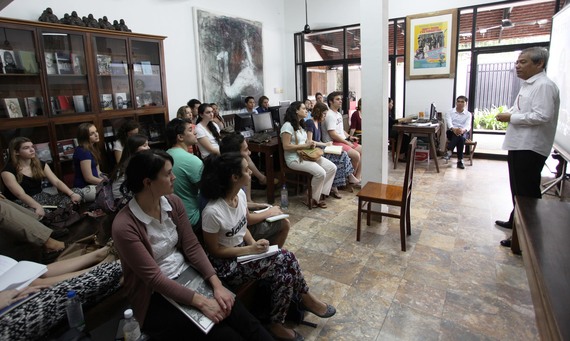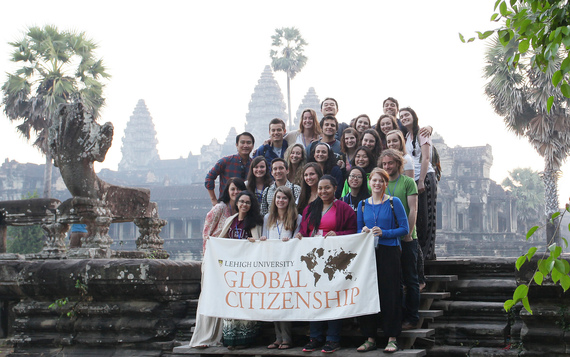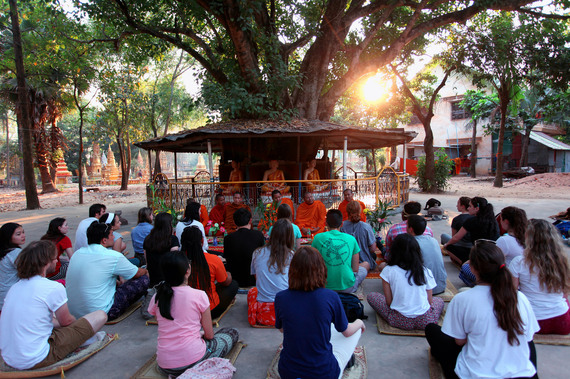The Global Citizenship program at Lehigh University, the oldest of its kind in the United States, provides students with the opportunity to experience a country's culture through the lens of a global citizen: a thoughtful and engaged traveler aware of the cultural diversity in a rapidly changing world. The two-week intersession trip we led to Cambodia required careful planning of not only events and logistics, but also working to expand student ownership of certain aspects of the trip. Our ultimate goal was to further engage students in critical analysis and reflection while helping them explore and develop their own sense of personal, social and corporate responsibility to a global community.
The concept of the trip activities follows Paulo Freire's "Pedagogy of the Oppressed" where students are seen as capable beings who can engage, reflect, and respond. Unlike previous years, we decided to experiment with student-led experiences. This cohort of GC students were new to the program, unlike students in the past with a full four-year experience instead of three. The fall semester was not only about preparing for the intersession trip, but also getting to know one another. Instead of the traditional one-hour, once a week course, we had several longer weekend workshops.
During the workshops, we gave presentations and introduced students to the past, present, and future elements of Cambodian contexts. By providing them with a holistic view of Cambodia from a multifaceted directive we gave them some background to work with as they decided, based on a chosen topic of interest for each group, how the experience they chose would help the whole group explore GC in both an introspective and reflective way. Based on the group's chosen topic (business, culture, government, health, education, human rights, and religion) students took to the internet to search for places to visit and people to speak with that would not only be of interest to them and align with their areas of expertise, but also align with the GC framework.

Students listen to Youk Chhang, Executive Director of the Documentation Center of Cambodia, talking about Khmer Rouge history, the tribunal, and the new Sleuk Rith Institute initiative. Photo: Sothy Eng
We troubleshooted from group to group, fielding questions when necessary and providing guidance if asked. Upon our approval, students presented their chosen place(s) to the rest of the cohort. Students had to justify their choice based on its relevance to the GC framework, the importance within Cambodia, and what they hoped they and their classmates would gain from the experience. Students then communicated with the chosen location, and with our approval, set up the experience. This allowed the students to take the ownership of their trip and engage in a variety of activities before and during the trip, fostering a sense of anticipation.
While on the trip, each evening the group responsible for an event that day would lead a whole group reflection. The group responsible for the next day's activity would give reminders for things to be looking for, proper attire, wake-up times, etc. For twelve days, from as early as 6 in the morning to 10 in the evening, everyone was fully alert and relationships were fostered. They ate together, talked together, were responsible not only for themselves, but for each other. They were fully invested in their own experience as well as the whole group experience.
Twelve days may seem like a short trip, but three cities, dozens of experiences, and a few unexpected events (like a view of the Sea Wall [in Marguerite Duras's], which some insist was the actual Sea Wall but probably wasn't) left us with a feeling of ultimate success and satisfaction. Unlike our past research trips with graduate students, this experience left us with a newfound appreciation for students exploring the world through the GC lens. They cried, laughed, fought, played, slept, and thought. They thought a lot.
Our strategy to take them from the capital of Phnom Penh, to the beaches of Sihanoukville, and ending up in Siem Reap at the temples of Angkor Wat was not by chance. We knew that Phnom Penh, a bustling and crowded city would challenge the students. It would immediately take them out of their comfort zones. And that's what an immersive GC experience is about. They saw the Killing Fields, they witnessed the United Nations tribunal, seeing Pol Pot's Brothers Number 2 and 3 through a massive bulletproof glass wall as they stood trial for their crimes against humanity.
They also saw a beautiful beach, just a few short minutes away from a devastated island, turned into a garbage dump from the exploitation of the tourist industry. They saw the majesty of Angkor Wat, the efforts to rebuild temples like Ta Phromh destroyed by war and neglect. For all of the pain and suffering they say, they also saw what it takes to rebuild. They saw the efforts of nongovernmental organizations working with everything from mental health to education. From the perspective of a global citizen, they saw firsthand the importance of critical appreciation and global awareness.
We are fortunate to have spent time with the students as they embarked on this adventure. While we know they learned a great deal, they taught us just as much. We visited many places with a group of people with a new and exciting look at things. They taught us to never take for granted how fortunate we are to work in Cambodia. And beyond that, how lucky we are to maintain relationships with them here at Lehigh. Running into students on campus and remaining a part of their Lehigh family is priceless. We always stop to get updates on their latest exams, adventures, and life in general. We are truly blessed to get to know such a remarkable group of students, who we are confident will become lifelong Global Citizens.
--
Whitney Szmodis, Research Scientist at Lehigh University's College of Education who also helps facilitate the trip, contributes to this article.


